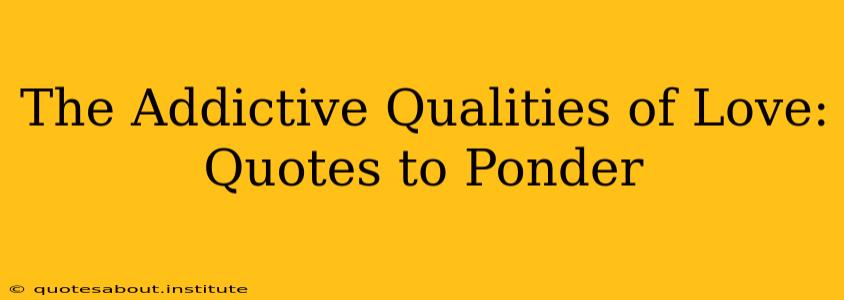Love. That powerful, exhilarating, sometimes agonizing emotion that shapes our lives, drives our actions, and inspires countless works of art. But have you ever considered the addictive qualities of love? It’s a topic rarely explored in its entirety, yet the parallels between romantic love and addiction are striking. This exploration delves into the compelling nature of love, examining its addictive aspects through insightful quotes and psychological perspectives. We'll explore the highs, the lows, and the often-blurred lines between passionate love and compulsive behavior.
What are the addictive qualities of love?
The addictive nature of love isn't about a clinical diagnosis of addiction, but rather the behavioral and emotional patterns that mirror addictive processes. The intense highs, the cravings, the withdrawal symptoms—these are all elements that resonate with the experience of addiction, albeit in a very different context. The brain's reward system, flooded with dopamine during the initial stages of passionate love, creates a powerful reinforcement loop. This surge of dopamine is similar to the effects of substances like cocaine or nicotine. The obsessive thoughts, the compulsive behaviors, the need to constantly check in with our beloved – these parallels are undeniable.
Is love an addiction?
While not a clinical addiction in the same way as substance abuse, love can share similar neurological and behavioral patterns. The obsessive preoccupation, the intense emotional highs and lows, and the potential for withdrawal symptoms when the relationship ends, all point to a compelling analogy. This isn't to say love is inherently bad or unhealthy; rather, it highlights the power of this emotion and the potential for unhealthy attachments to develop if not managed carefully.
What are the signs of love addiction?
Identifying a problematic pattern of attachment that resembles addiction requires careful self-reflection. Some common signs include:
- Obsessive thoughts: Constantly thinking about your partner, even to the detriment of other aspects of your life.
- Needing constant reassurance: Feeling anxious and insecure if you don't receive constant validation from your partner.
- Neglecting other relationships: Prioritizing your romantic relationship above all else, pushing away friends and family.
- Low self-esteem: Defining your self-worth entirely through your relationship.
- Ignoring red flags: Overlooking warning signs of abuse or unhealthy behaviors in your relationship.
- Difficulty breaking up: Feeling unable to leave a toxic or unhealthy relationship, even when it's clearly damaging.
How is love addiction treated?
Addressing unhealthy attachment patterns requires a multi-faceted approach, often involving therapy. Cognitive Behavioral Therapy (CBT) can help individuals identify and challenge negative thought patterns and behaviors associated with love addiction. Furthermore, therapy can assist in building healthier coping mechanisms and developing a stronger sense of self-esteem. Self-help strategies such as mindfulness practices and journaling can also play a vital role in managing emotional responses and establishing healthier relationship dynamics.
Is there a difference between love and infatuation?
Infatuation, often mistaken for love, is characterized by intense passion and desire, but lacks the depth, commitment, and genuine connection associated with mature love. Infatuation is often driven by idealized perceptions and a rush of dopamine, creating a temporary high that fades over time. Love, on the other hand, involves a deeper emotional connection, mutual respect, and a willingness to work through challenges together. While infatuation can mimic the addictive qualities of love due to its intense initial phase, the underlying dynamics are vastly different.
Can love be unhealthy?
Absolutely. While love is a fundamental human experience, it can manifest in unhealthy ways. Co-dependency, control, abuse, and manipulation are all examples of unhealthy relationship dynamics. The addictive qualities of love can become particularly dangerous in these contexts, creating a cycle of dependence and abuse that is difficult to break. Recognizing the signs of unhealthy love is crucial for protecting oneself and seeking help.
How can I have a healthy relationship?
Cultivating healthy relationships requires self-awareness, communication, and a willingness to prioritize your well-being. Establishing boundaries, respecting each other’s individuality, and fostering mutual trust are vital aspects of a healthy relationship. Seeking professional guidance from a therapist or counselor can also provide valuable support and insights into improving relationship dynamics. Remember, healthy love is not all-consuming; it's a balanced and nurturing partnership that enhances, rather than diminishes, your overall well-being.
This exploration of love's addictive qualities aims to offer a nuanced perspective, highlighting both its powerful allure and the potential for unhealthy attachments. By understanding the complexities of this fundamental human emotion, we can cultivate more fulfilling and balanced relationships, celebrating the joys of love while avoiding its potential pitfalls.

